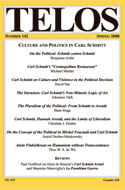Each Tuesday in the TELOSscope blog, we reach back into the archives and highlight an article whose critical insights continue to illuminate our thinking and challenge our assumptions. Today, Francisco Unger looks at Michael Marder’s article “Carl Schmitt’s ‘Cosmopolitan Restaurant’: Culture, Multiculturalism, and Complexio Oppositorum,” from Telos 142 (Spring 2008).
 Michael Marder’s essay on Carl Schmitt’s concept of complexio oppositorum, a term elaborated in Schmitt’s Roman Catholicism and Political Form (1923), takes up this “complex of opposites” as a framework for understanding culture. Marder makes the provocative argument that what is normally a decorative centerpiece in the mantle of depoliticized liberalism, “multiculturalism,” can be rescued on Schmittian grounds in order to militate against the somnolence of its former master. When it is understood as the recognition of a charged plurality, or a complex of opposite cultures, multiculturalism satisfies the need for a living politics. Cultures are not paying mere lip service to a common framework of socially entrenched goals, or to the proselytizers of universalism by day (political players by night), but now cultures are seen as vehicles for a people’s political particularity. For Marder, novels, films, languages, manners, etc., can become political weapons by which a disempowered group shatters the fiction of an all-inclusive consensus, and intrudes on the atmosphere of sterility that often accompanies liberalism’s claim to “universality.”
Michael Marder’s essay on Carl Schmitt’s concept of complexio oppositorum, a term elaborated in Schmitt’s Roman Catholicism and Political Form (1923), takes up this “complex of opposites” as a framework for understanding culture. Marder makes the provocative argument that what is normally a decorative centerpiece in the mantle of depoliticized liberalism, “multiculturalism,” can be rescued on Schmittian grounds in order to militate against the somnolence of its former master. When it is understood as the recognition of a charged plurality, or a complex of opposite cultures, multiculturalism satisfies the need for a living politics. Cultures are not paying mere lip service to a common framework of socially entrenched goals, or to the proselytizers of universalism by day (political players by night), but now cultures are seen as vehicles for a people’s political particularity. For Marder, novels, films, languages, manners, etc., can become political weapons by which a disempowered group shatters the fiction of an all-inclusive consensus, and intrudes on the atmosphere of sterility that often accompanies liberalism’s claim to “universality.”
So what can Coltrane, Faulkner, and the Brown Bomber tell us about the prospects for a revitalized multiculturalism? Marder acknowledges two main challenges to the notion of turning to culture for political representation. The first is the reduction of culture to pure entertainment, and the second is what Marder sees as an association of culture with death in the West. But Marder uses a second aspect of Schmitt’s complexio oppositorum, its emphasis on the living relationship of particular elements to form, to argue that cultures can represent the identities of politicized groups without succumbing to the general morass. “Form” should not be associated with conceited Western rationalism, or proceduralism from above, light in danger and lacking in spice. Schmitt’s “form” is angled against Hegelian synthesis, and the complexio attempts to nourish struggle from below rather than to instantly sublimate the parts into a synthesis that resolves conflict upon demand. While we may all be spectators in the restaurant of debased American culture, Marder’s instinct to turn to culture for political inspiration can be understood as an appeal for us to become more serious and discerning readers, archivists, and, yes, consumers of our American culture. In the American melting pot, we should actively seek out everything indigestible. As Marder writes:
A form of forms victimized to the greatest extent in the age of neutralizations and depleted to the point of merging with entertainment, culture holds the highest potential among the other “shipwrecks” of depoliticization (economics, morality, technicity, etc.) to resist this dominant trend and to give a new impetus to the political.
Marder insists that unlike its
liberal counterpart, which cleverly passes totalitarian rigidity for the tolerance of “otherness” and “diversity,” the proposed Schmittian multiculturalism does not pre-delineate the terrain for political engagements, nor does it project culturally specific attitudes and beliefs onto the contrived sphere of universality. Akin to the complex, it embraces the sometimes contradictory cultural particularities in a non-totalizable fashion, keeps open the space for political antagonism, functions as a radically pluralistic living form, and non-transcendentally expresses the truth of culture.
Marder asserts that forcing multiculturalism to face up to its own philosophical premises can force it into either living up to the creed or shedding its duplicity. Either way, Marder concludes, this challenge will not be merely semantic, or utopian. By forcing liberalism to reckon with the “enemies” in its midst, Schmittian multiculturalism can instigate the type of authentic controversy out of which any revival of the political must spring.
Read the full version of Michael Marder’s article “Carl Schmitt’s ‘Cosmopolitan Restaurant’: Culture, Multiculturalism, and Complexio Oppositorum“ at the TELOS Online website. If you are affiliated with an institution that is an online subscriber to Telos, you have free access to our complete online archive. If not, you can purchase 24-hour access to this and other Telos articles at the low rate of $5/article.



